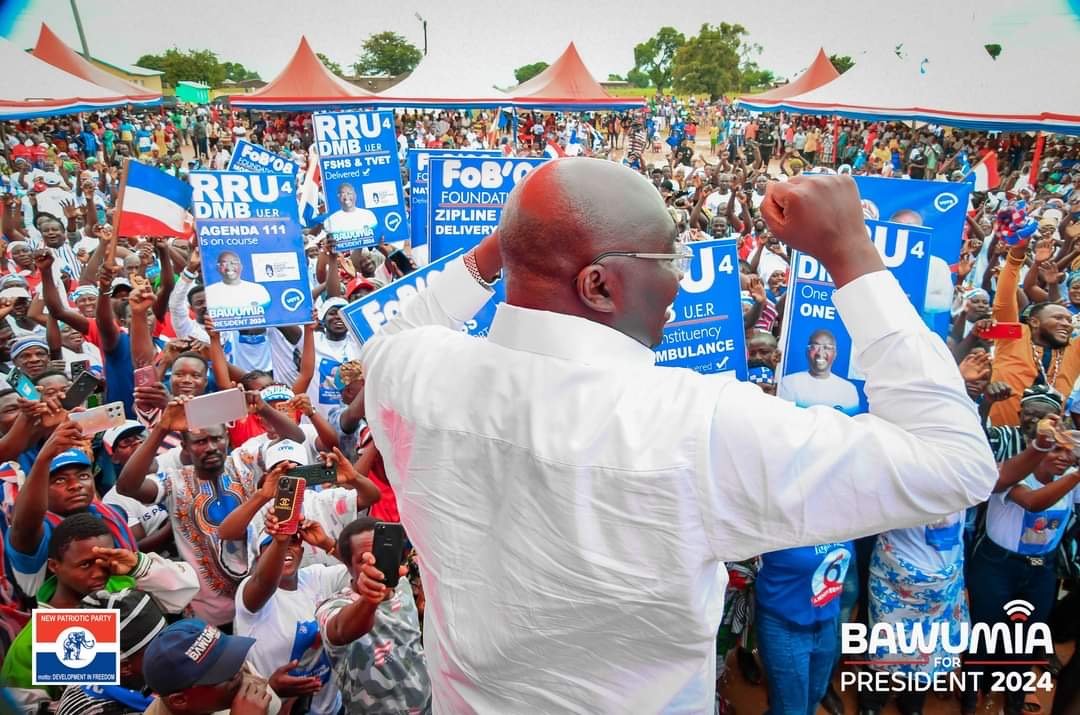News
“Given the right tools, the Ghanaian has the potential to achieve unimaginable heights”

Vice President and the flagbearer of the New Patriotic Party(NPP), Dr.Mahamudu Bawumia has said that Ghanaians have the potential to achieve unimaginable heights when given the right tools.
“Given the right tools – education, skills, mindset of possibilities, etc – the Ghanaian has the potential to achieve hitherto unimagined heights.”
He made this statement during his engagement with the Chiefs and people of the Bongo, Chiana-Paga and Navrongo constituencies Tuesday.
He continued to explain his 70-point agenda for Ghana’s accelerated development, including a focus on attaining sustainable macroeconomic stability, the introduction of a new tax system, building a digital economy and making Ghana a digital hub, power sector reform, and maximization of the benefits from natural resources.
The rest of the agenda includes industrialization for jobs, fighting corruption using digitization and a cashless society, development of a credit system for Ghana, increasing collaboration with faith-based organizations, care for the vulnerable and special needs, and additional priorities.
Dr.Bawumia had rounded up his campaign tour of the Northern part of the country.
By Edem Mensah-Tsotorme
News
Damango wages war on shisha smoking among minors

Troubled and anxious citizens in Damongo of the Savannah Region have expressed concerns about the number of young people, believed to be under the age of 18, involved in ‘shisha’ smoking in pubs and drinking spots within the township.
Eyewitnesses say the minors were seen patronising nightlife venues, where Shisha smoking happen in the open.
The situation has sparked renewed public concern over the enforcement of child protection laws and regulations governing the operations of entertainment centres in the municipality and country as a whole.
An eyewitness, who spoke to The Spectator on conditions of anonymity for security reasons, noted that the situation was becoming increasingly common.
“This is not a one-off incident. It is becoming very common, but residents like us cannot openly report or speak about it because our lives will be at risk,” he said.
Under Ghanaian law, minors were prohibited from patronising Shisha.
Public health experts have consistently warned that shisha use exposes users to harmful substances that can negatively affect brain development, respiratory health, and overall well-being, particularly among young people.
The residents believe the alleged incidents point to broader challenges relating to youth supervision, substance abuse, and weak enforcement of existing regulations and have called on municipal authorities, security agencies, and regulatory bodies to intensify monitoring of pubs and entertainment centres to ensure compliance with the law.
In an effort to address the menace, Mr Salisu Be-Awurbi, the Savannah Regional Minister, has led public education campaigns, engaged security agencies, and supported enforcement actions to address the rising use of illicit substances in the region.
Wura Kelly Seidu Boresah I, the Chief of Damongo, has also called on all stakeholders including parents, community leaders, institutions, and young people to actively support efforts to curb drug abuse, warning that the rising consumption of hard drugs poses a serious health threat to the future of the youth in the Savannah Region.
He also cautioned individuals involved in the sale and distribution of illicit drugs to immediately desist from the practice, stressing that offenders will face arrest and prosecution in accordance with the law.
From Geoffrey Buta, Damongo, Savannah Region
Join our WhatsApp Channel now!
https://whatsapp.com/channel/0029VbBElzjInlqHhl1aTU27
News
Ga Mantse endorses initiative to end domestic voilence

Dr Theresa Baffour, an advocate for ending violence and Chief Executive Officer (CEO) of SAHM SAHW Foundation, has said that society plays a critical and pivotal role in breaking the cycle of domestic violence.
According to her, domestic violence is a major contributor of making women, who are mostly the victims, mentally derailed and unable to engage in economic activities.
She said this when the foundation called on the Ga Mantse, Nii Tackie Teiko Tsuru II, to solicit support for the initiative by the “Strong and Healthy Minds, Strong and Healthy Women” (SAHM SAHW) to combat domestic violence within the Ga State.
The visit was occasioned by the fact that domestic violence cases have become quite prevalent in the Ga communities and is retarding growth.
According to her, the canker was an impediment to national development because the victims were usually tortured and would have to go through series of therapies to return to the right state of mind.
Dr Baffour mentioned that Gender-Based Violence (GBV) places a mental toll on women, and was, therefore, important to break the cycle through comprehensive mental health support, crisis intervention and empowerment programmes in communities with high rates of GBV.
This intervention, she underscored, would help in empowering the denigrated victim of domestic violence to soundly heal, build and thrive.
Dr Baffour added that the initiative would provide holistic, trauma-informed mental health care and advocacy for young women affected by domestic violence.
According to her, the above statement would create safe spaces for healing and equipping them with entrepreneurial skills for renewed hope and empowered life.
The Ga Mantse pledged his support for the laudable initiative to combat domestic violence and also acknowledged the need to address it in the Ga State.
Further endorsement came from Justice Julia Naa-Yarley Adjei Amoah, Chief of Staff at the Office of the Ga Mantse, as she commended the team of SAHM SAHW Foundation for taking a bold step to end the canker in the Greater Accra.
She added that it was a step in the right direction to save vulnerable women from torture, stress and emotional abuse.
By Alfred Nii Arday Ankrah







